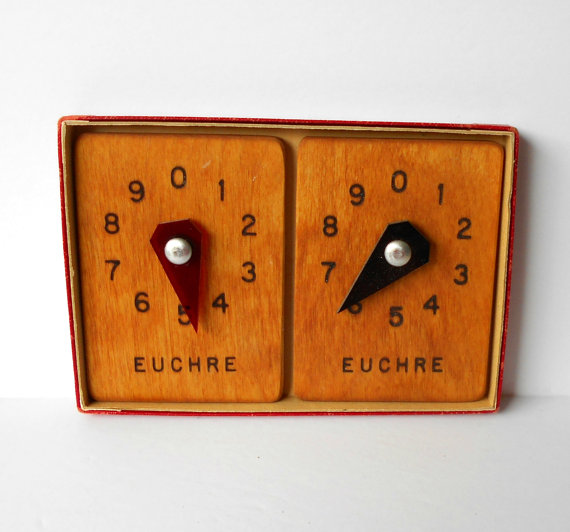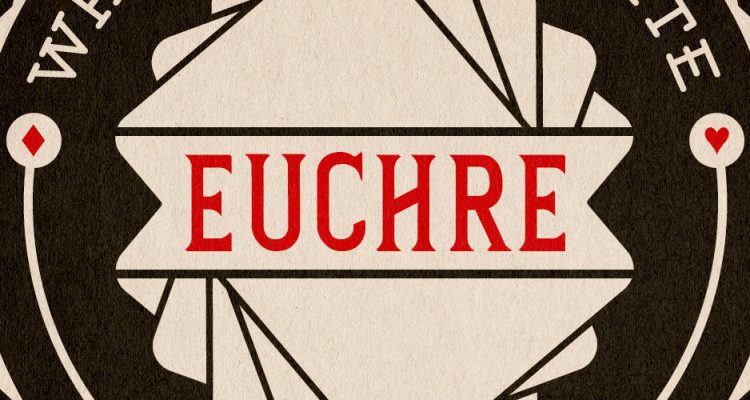Twenty or thirty years or so ago, a wearied traveler venturing through the coal-infused hills of Appalachia steps off his beaten path and takes refuge in one of Wheeling’s countless taverns. Sidling up to the bar through wafts of thick, sweet smelling cigar smoke, he is greeted with a warm laughter that he hasn’t felt since leaving his home out West. He orders a dollar draft as he slaps his gloves onto the bar and rubs his red, freezing hands together. Someone in that dimly-lit, smoke filled room rings out in a manner not unlike an auctioneer, “Two bucks a game, fifty cents a Euchre!” The man shifts his thawing gaze to the corner of his eyes and discovers the smoke’s source. An old man, his skin aged to a brown leather, shuffles an even older deck of ratty cards and disperses it with an unencumbered fluidity while reminiscing to the three other players about his past as a barge captain. The man’s beer on the bar goes warm. He cannot tear his attention away from this spectacle before him. Loose change rattles on the tabletop as the game escalates to the intensifying cadence of the old man’s tale. Unlike the calculating silence inherent in a game of poker, this game continues almost completely unnoticed while the players imbibe themselves deeper and deeper into an ever unfolding conversation colored by wit and humor. The players’ movements remind him of singing along to an unknown song; even though the mind hasn’t memorized the song, each prenatal gust of air seems to form itself into the correct resolving note upon its utterance. A stinging sensation from the burning butt of a cigarette shoots through his body, and drags his mind back across the room to the bar. It’s nearly midnight, the game has just wrapped, and the bartender signals it’s closing time by wiping down the bar with a rag. The man leaves into the night. Upon his further travels on that cold, unwelcoming route, and when visiting home, he fondly remembers that nameless bar in Wheeling, West Virginia where a curious, little card game filled an entire room with such merriment and warmth.

Euchre, for those of you who don’t know, is a card game typically played among four players that centers upon winning a certain number of “tricks” or hands. An exact point of origin for the game hides in an obscured past that became distorted as people dispersed the game in migration patterns. Many scholars attribute British, German, and Swedish immigrants entering the American Midwest with bringing over similar card games from their homelands that intermixed with each other to form what we recognize today as Euchre. As they traveled westward, the popularity of the game grew nationwide in the 19th Century. Traditionally, it has been a working class pastime. President Ulysses S. Grant was known for preferring his clay pipe accompanied by a game of Euchre over attending the symphony. In the proceeding years, however, Euchre has died out in large parts of the US. One may be disappointed to be met with vacant stares when asking others to play a game or two while traveling abroad. The question then becomes why has Euchre made its home here in the Ohio Valley?
I met my longtime friend AJ Zambito at a generic Longhorn Steakhouse over martinis and talk about the game. I was introduced to AJ over six years ago when he first opened open mic nights at the late Grindhouse Cafe, which sat on the corner of St. Clairsville’s main street. An entrepreneur, he enjoys conversing about anything from Euchre to philosophy to the latest Stephen King novel, as he has been everywhere from trucking through South America in the US military to being a local restaurateur. He begun the conversation by revealing a pack of cards, modified to exactly 24 cards excepting those for scoring, in his shirt pocket. He explains, “I always keep a pack on me. Whether its in my pocket, the car, wherever, you never know when someone’s up for a game.” Its spontaneity reveals part of Wheeling’s love affair with the game. Euchre can be played anywhere with anyone. It’s a very simple game, and around here it is considered uncommon for someone to ask to be taught its rules. AJ described it as a rite of passage in this area’s culture that is not unlike learning how to swim or skip stones. He learned at a very early age where he would travel out to his friend’s camp on Wheeling Creek, or colloquially referred to as “Out the Crick,” on the weekends. To this day thirty or so years later, this same group of friends finds new stories to tell as they deal cards by the creek. The game enables socializing due to its routine and methodical nature. AJ demonstrates with his palms, “It’s something to do with your hands while you tell stories for hours.” Overhearing our conversation, the waitress affirmed that she too was an avid player as she unloaded our second round of martinis onto the table. While understanding that the game acted as a common language possessing the power of bringing people together through the sharing of stories, I queried further into why Euchre has had such a historical hold on Wheeling. “It’s rooted in Wheeling’s history as a gambling town,” AJ begins. He recounts coughing on smoke and watching old men play Euchre over quarters and dimes in bars before the state gambling laws were strengthened. “Now you go into a bar, whip out a deck, and the staff gets all nervous as they ask you to put it away,” he shakes his head sadly. Turning back from his regression, he continues, “Think about Euchre as Poker’s poor cousin. You enjoy the fun part of gambling, but at the end of the day, you’re not going to lose the house.” Unlike playing high stakes poker or shooting craps, Euchre suits anyone well from the businessman to the dock worker on a beer budget. In a way, it reflects the Friendly City’s values. No matter who you are, this is a game that allows you to simply enjoy idle time with warm company and a cold brew.
As the check approached, I looked at my empty martini glass, AJ’s worn deck, and the paradox.




